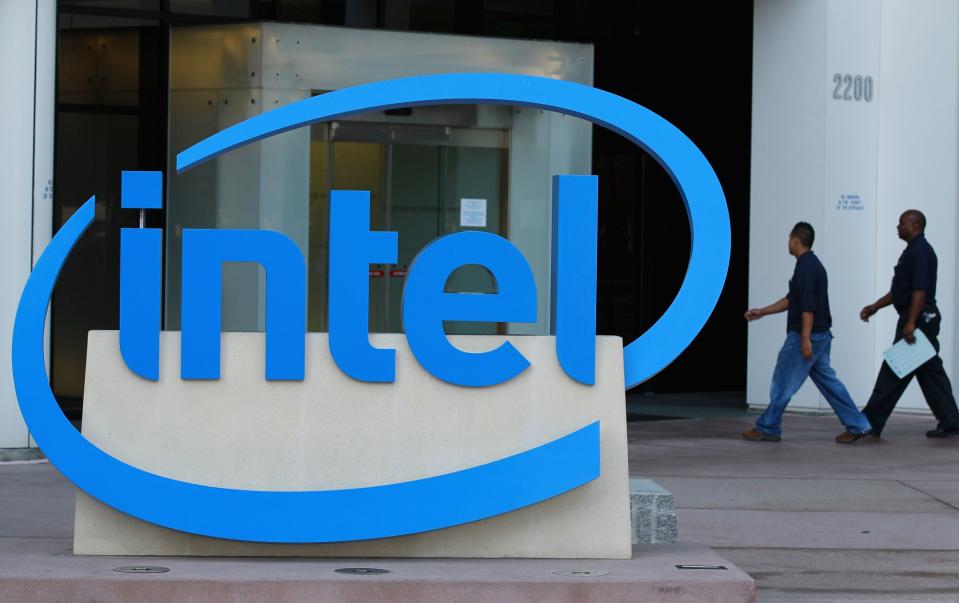Losing Apple won't kill Intel

Apple (AAPL) is reportedly developing its own processors to replace the chips that Intel (INTC) currently supplies for the iPhone maker’s Mac line of desktops and laptops. And according to Bloomberg, the changeover might happen as soon as 2020.
As you’d expect, Intel’s shares took a major hit following the news, falling 6% at market close on Monday. It’s certainly a blow to Intel, but it may not be as big of a deal as the sell-off would suggest.
That’s because Apple is only Intel’s fifth largest customer behind giants like Dell, HP and Lenovo, and according to Mercury Research’s Dean McCarron, makes up just $600 million in sales per quarter. In 2017, Intel’s PC division made $34 billion, Reuters reported. In total, the company made $62.8 billion in revenue in 2017.
It’s also worth noting that Intel is still the undisputed leader when it comes to processors for desktop and laptop computers across the board. As McCarron points out, Intel owns 88% of the laptop and desktop market worldwide. Its nearest competitor, AMD (AMD) has seen growth in the sector as of late thanks to its Ryzen chips, but it’s still far from a threat to Intel’s dominance.
And Apple hasn’t always used Intel chips. The Cupertino-based company previously used PowerPC processors, until former-CEO Steve Jobs announced the transition to Intel in 2005.
By making its own chips, Apple would be able to build specific features into its laptops and desktops without the need of a third-party manufacturer like Intel. It would also enable Apple to further merge its Mac line of computers with mobile devices like the iPhone and iPad.
Producing its own processors will also further differentiate Apple’s machines from competitors like Dell and Lenovo. But the company will have to ensure that its own chips are able to match the capabilities of its current Intel-powered computers.
The challenges ahead
While losing Apple will sting Intel, the desktop and laptop markets haven’t been bastions of good fortune for the chipmaker over the last few years. Sales of PCs decreased precipitously for years, as fewer people upgrade as often, and smartphones and tablets have become the primary computing devices for more consumers.
More recently, sales have begun to even out, with IDC reporting that the market saw 0.7% year-over-year growth in the fourth quarter of 2017, noting not to expect astronomical growth from this sector.
As far as overall PC share goes, Apple’s laptops, desktops and workstations made up just 8.2% of the market, with HP, Lenovo and Dell making up the vast majority of sales.
Intel was also hit especially hard by the revelation of the Spectre processor flaw that made it possible for hackers to gain access to fundamental pieces of users’ computers by tripping up the company’s CPUs. AMD had similar problems with a slightly different flaw, but since Intel makes up such a dramatic portion of the market, the Spectre flaw impacted a far larger number of consumers.
While Intel is best known for its stickers on PCs indicating the presence of the company’s chips under the hood, the most important business for the processor giant is the cloud. Intel powers the vast majority of servers currently in use.
In fact, according to U.S. News & World Report, Bank of America analyst Vivek Arya indicates that Intel controls more than 90% of the server market. And while the PC industry isn’t predicted to see huge growth opportunities anytime soon, Arya says the cloud industry could see capital expenditure growth of 30% in 2018.
But Intel’s lead isn’t necessarily safe, as Nvidia and AMD are working to dethrone the current market leader. Nvidia (NVDA) in particular highlighted its server business during the Consumer Electronic Show earlier this year, pointing out the power savings clients could see by using Nvidia-powered servers.
So, while losing Apple is sure to take the wind out of Intel’s sales in the short term, it’s unlikely to truly hurt the company going forward.
More from Dan:
Email Daniel Howley at [email protected]; follow him on Twitter at @DanielHowley.
Follow Yahoo Finance on Facebook, Twitter, Instagram, and LinkedIn
